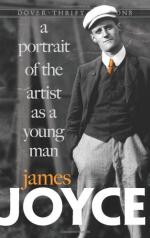—Do you know what Ireland is? asked Stephen
with cold violence.
Ireland is the old sow that eats her farrow.
Davin rose from his box and went towards the players, shaking his head sadly. But in a moment his sadness left him and he was hotly disputing with Cranly and the two players who had finished their game. A match of four was arranged, Cranly insisting, however, that his ball should be used. He let it rebound twice or thrice to his hand and struck it strongly and swiftly towards the base of the alley, exclaiming in answer to its thud:
—Your soul!
Stephen stood with Lynch till the score began to rise. Then he plucked him by the sleeve to come away. Lynch obeyed, saying:
—Let us eke go, as Cranly has it.
Stephen smiled at this side-thrust.
They passed back through the garden and out through the hall where the doddering porter was pinning up a hall notice in the frame. At the foot of the steps they halted and Stephen took a packet of cigarettes from his pocket and offered it to his companion.
—I know you are poor, he said.
—Damn your yellow insolence, answered Lynch.
This second proof of Lynch’s culture made Stephen smile again.
—It was a great day for European culture, he said, when you made up your mind to swear in yellow.
They lit their cigarettes and turned to the right.
After a pause
Stephen began:
—Aristotle has not defined pity and terror. I have. I say—
Lynch halted and said bluntly:
—Stop! I won’t listen! I am sick. I was out last night on a yellow drunk with Horan and Goggins.
Stephen went on:
—Pity is the feeling which arrests the mind in the presence of whatsoever is grave and constant in human sufferings and unites it with the human sufferer. Terror is the feeling which arrests the mind in the presence of whatsoever is grave and constant in human sufferings and unites it with the secret cause.
—Repeat, said Lynch.
Stephen repeated the definitions slowly.
—A girl got into a hansom a few days ago, he went on, in London. She was on her way to meet her mother whom she had not seen for many years. At the corner of a street the shaft of a lorry shivered the window of the hansom in the shape of a star. A long fine needle of the shivered glass pierced her heart. She died on the instant. The reporter called it a tragic death. It is not. It is remote from terror and pity according to the terms of my definitions.
—The tragic emotion, in fact, is a face looking two ways, towards terror and towards pity, both of which are phases of it. You see I use the word arrest. I mean that the tragic emotion is static. Or rather the dramatic emotion is. The feelings excited by improper art are kinetic, desire or loathing. Desire urges us to possess, to go to something; loathing urges us to abandon, to go from something. The arts which excite them, pornographical or didactic, are therefore improper arts. The esthetic emotion (I used the general term) is therefore static. The mind is arrested and raised above desire and loathing.




